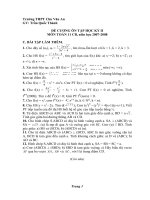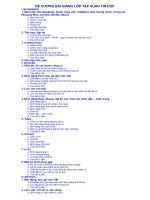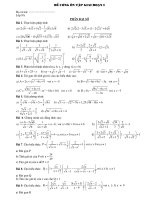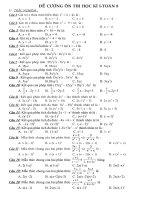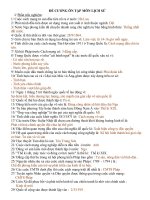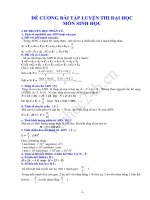De cuong &bai tap Av8HKII
Bạn đang xem bản rút gọn của tài liệu. Xem và tải ngay bản đầy đủ của tài liệu tại đây (135.99 KB, 4 trang )
ĐÊ
̀
CƯƠNG ANH 8 HO
̣
C KY
̀
II
A. Lý thuyết
1. . Present perfect tense( Thì hiện tại hoàn thành )
* Form : S + HAVE/HAS + V-ed/cột 3
- Use :- Dùng để miêu tả một hành động xảy ra trong quá khứ nhưng kết quả còn lưu đến hiện tại
- Dùng để miêu tả một hành động vừa mới xảy ra ( ta dùng với JUST)
- Dùng để miêu tả một hành động được hoàn tất sớm hơn sự mong đợi (ta dùng với ALREADY)
Ex: I have already finished this work.
- Dùng để miêu tả một hành động từ trước đến giờ chưa hề hoặc không hề xảy ra ( ta dùng với
EVER –NEVER) . Ex: Have you ever been to Hue? I have never gone.
- Dùng để miêu tả một hành động đã xảy ratrong quá khứ tính đến nay đã xảy ra được bao lâu
(FOR) hoặc đã xảy ra từ lúc nào (Since)
* For : Chỉ thời gian kéo dài bao lâu. Ex: You have studied English for 4 years.
* Since: thời gian bắt đầu từ lúc nào Ex: She has studied English since 2003.
2. Past progressive ( Thì quá khứ tiếp diễn )
- Form : S + WAS / WERE + V-ing
- Use: - diễn tả sự kiện xảy ra ở một thời điểm cụ thể ( giờ ) trong quá khứ
Ex: What were you doing at 2 p.m. yesterday?
- diễn tả một sự kiện đang diễn tiến bất chợt một sự kiện khác xảy đến ở quá khứ.
Ex: Last night when I was doing homework, the electricity went out.
- diễn tả hai hay nhiều sự kiện xảy ra cùng một lúc song song ở quá khứ
Ex: Last Friday as I was swimming at the pool, my father was visiting the City Museum.
* Note: Thì khứ tiếp diễn thường dùng với WHEN,WHILE hay AS để chỉ sự kiện đang diễn tiến.
3. Future simple Tense ( Thì tương lai đơn)
- Use : Diễn tả một hành động sẽ xảy ra tại một thời điểm nào đó trong tương lai.
- Form : + S + will / shall + V + …………Ex: He will finish his homework tomorrow .
- S+ won’t / shan’t + V + ……………Lan won’t go to the zoo next week.
? Will / Shall + S + V + … ? Will you do this exercise ?
* ALWAYS with progressive: always dùng với thì tiếp diễn để diễn tả sự kiện thường xuyên xảy ra với
sự không hài lòng hay than phiền (Ex: He is always coming to work late.)
4 . The passive form (voice)
Form: S + BE + V
3
/V-ed (past participle)...+ by + O
Ex: They sell jeans all over the world. => Jeans are sold all over the world.
Note:- Khi chủ ngữ câu chủ động là: THEY, PEOPLE, SOMEONE, NO ONE, ANYONE thì khi đổi sang
câu bị động không có By agent . Nhưng khi danh từ làm chủ ngữ bắt buộc phải có agent.
Tenses Active form ( chủ động) Passive ( bị động)
Simple present S + V/V-s/es + O S + am/is/are+V-ed/cột 3 +...... by O
Simple past S + V-ed/cột 2 + O S + was/were+V-ed/cột 3 +...... by O
Present perfect S + have/has + O S + have/has +V-ed/cột 3 +....... by O
Simple Future S + will + V(bare-inf) + O S + will + be+V-ed/cột 3 + ........by O
- Với động từ đặc biệt (modal verbs): CAN, MUST, MAY, MIGHT, SHOULD, WILL,.
S + modal verb + be + V-ed / V
3
(past participle)
Ex : You must do this exercise carefully. => This exercise must be done carefully.
5. Adjectives followed by an infinitive or a clause.
(Tính từ được theo sau bởi một động từ nguyên mẫu hay một mệnh đề.)
1.Tính từ chỉ cảm giác thường được theo sau bởi một cụm động từ nguyên mẫu (infinitive phrase).
S + be + adjective + (not) infinitive phrase. Ex .: I’m glad to meet you again.
He was surprised to get me letter.
Một số tính từ khác như : sure, certain, right, careful, lucky, wrong, … được theo sau bởi một cụm động từ
nguyên mẫu. Ex . : He’s certain to win the game. Be careful not to dirty the picture.
2.Một số tính từ có thể được theo sau bởi một mệnh đề danh từ (a noun clause).
Ex: I’m glad ( that ) you can make it.
6. In order to – so as to + V( bare form) : được dùng để diễn tả mục đích
1
Ex: He’s saving money in order to / so as to go on holiday next summer.
7. -ed and -ing participle( Quá khứ và hiện tại phân từ )
- Hiện tại phân từ “- ING” còn gọi là phân từ tác động. Ex: His job is boring.
- Quá khứ phân từ “ – ED” còn gọi là phân từ bị tác động. Ex: This clock is broken.
* Quá khứ và hiện tại phân từ : Đứng trước danh từ, hoặc sau động từ liên kết
Ex: A tired worker is sleeping on the chair. The story is interesting
* Quá khứ và hiện tại phân từ: được dùng để rút gọn mệnh đề tính từ
Ex: The boy is in my class . He’s reading a book. → The boy reading a book is in my class.
There are many books. They are written in English. → There are many books written in English.
8.Compound nouns ( danh từ kép)
- Noun + Gerund : danh từ làm túc từ cho danh động từ. Ex: fire – making , rice – cooking, …
- Gerund + Noun : danh động từ phân loại danh từ , chỉ loại và mục đích cho danh từ.
Ex: Washing-machine; working- condition; waiting – room ; . . .
9. Reported speech ( lời nói trần thuật) là câu thuật lại một cách gián tiếp lời nói
của người khác. Để chuyển từ trực tiếp sang câu gián tiếp chúng ta phải:
* Thay đổi về thì (Tense change) :- Nếu động từ thường thuật (reporting verb) của câu ở thì quá khứ thì
phải lùi động từ chính về quá khứ một bậc khi chuyển từ lời nói trực tiếp (direct speech) sang lời nói gián
tiếp (indirect / reported speech) theo quy tắc sau :
Direct speech - Indirect / reported speech)
Simple present Simple past
Present progressive Past progressive
Will Would
Must had to
- Nếu động từ tường thuật ở thì hiện tại thì thì của động từ chính được giữ nguyên khi chuyển lời nói trực
tiếp sang gián tiếp.Trạng từ chỉ nơi chốn,thời gian và đại từ chỉ định được giữ nguyên.
* Một số chuyển đổi khác (Some other changes) : Khi chuyển từ lời nói trực tiếp sang gián tiếp mà động
từ tường thuật ở thì quá khứ thì các trạng từ chỉ thời gian và nơi chốn và đại từ chỉ định được chuyển đổi
theo quy tắc sau :
Direct speech Reported speech
today / tonight that day / that night
tomorrow the next day / the following day
yesterday the day before /the previous day
ago / now before / then
next/ on Monday the next/ following Monday
last Monday the previous Monday / the Monday before
the day after tomorrow in two days’ time / two days later
this / these that / those
here there
Một số loại câu tường thật
1. Yes- No questions:
Form: S + asked + ( O ) + if/ whether + S + V ( lùi 1 thì )
Ex: “ Do you see new friend?” he said → He asked if you saw new friends.
2. Statements :
Form : S + said + ( that ) + S + V ( lùi 1 thì )
told + O +
Ex: “ I ’m leaving here tomorrow,” said Mary
- Mary said (that) she was leaving there the next day.
10. Would you mind/Do you mind............?
*Yêu cầu ai làm gì: Would you mind/ Do you mind + Ving.........?
Ex : Would you mind clean the board ?
* Xin phép ai làm gì: Would you mind + if + S + V ( simple past tense )
Do you mind + if + S + V ( present tense )
2
B. Bài tập:
I. Put the verbs in brackets into correct tenses or forms :
1. Cloth bags ( use) instead of plastic bags.
2. It's lovely ( see) you again.
3. We are happy (receive) a lot of presents from our grandparents.
4. Would you mind if I ( turn) on the TV ?
5. Do you mind (play) the tape once more ?
6. Would you mind ( tell) me how you learn English at school?
7. The woman ( hold) a brown bag was Nam's mother.
8. The table (make) of metal needs repairing.
9. The film ( show) on TV last night won the first prize in the film festival.
10. The students( talk) to the principal are from class 8A.
11. I (wait) for my friends outside the stadium when he ( arrive)
12. How fast the girl ( ride) when the accident ( happen) ?
13. Yesterday, Tuan (ask) me (go) to the station with him, but I (not/want) to leave the house because I
(wait) for the call.
14. During the study period class yesterday, it (be) hard for us to concentrate because the students net
door (make) so much noise.
15. This computer is the best one I (ever/use).
16.This is the first time he ( visit) Quang Tri.
17. I don't know how ( answer) your questions.
18. Keep quiet! You ( always/ talk) in class.
19.This house ( not/ use) for a long time.
20. My mother ( go) to see the dentist this afternoon.
21. I decided ( stay) .................................at home and learn my lesson.
22. When I (see) .................................you yesterday, you (play) .......................soccer in the street.
23. Students should (work) .................................hard on their English grammar.
II. Change the sentences into passive voice:
1. Every year Viet Nam export millions tons of rice.
2. After Tet holiday Vietnamese usually plant trees in their neighborhood.
3. How many festivals do you celebrate in you community?
4. What have you done since you came back?
5. They repaired our desk last week.
6. We haven't seen him for a long time.
7. No body has meet our grandmother since last night.
8. The girls separated the rice from the husk.
9. They will build a new house next year.
10. We are going to buy a car.
III. Rewrite the following sentences :
1. The tourist asked," Is it far from Hanoi ?"
2. My mother said to me," I think you will be successful."
3. I asked him," Do your parents speak English ?"
4. The teacher said to us," you must try your best to study hard for your exam."
5. Can I borrow your dictionary ?- Would you mind...................................
6. Could you solve this math problem for me ?- Do you mind...........................
7. The boys are in the volunteer group of Long An School. They are planting trees on the hill. ( using
present participle to combine)
8. The pen is mine. It's put in the box.( using past participle to combine)
9. I passed all the exams. I'm happy ( adj + to inf.)
10.You are interested in protecting environment. We are delighted. ( adj+ noun clause)
11.He asked: " Are you free on Sunday, Lan?" ( Reported speech)
12. They opened the Golden Gate Bridge in San Francisco in 1937. ( Passive form)
3
13. " We are waiting for the bus", said the children. ( Reported speech)
14. - Please tell me how can you make sticky rice cakes? ( S + V + Wh + To Inf)
I'm sorry. I don't know ...........................................................................................................................
4
